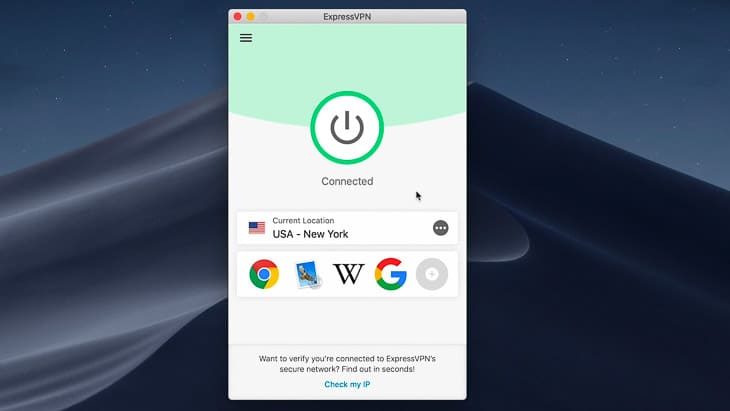
ExpressVPN Pricing: Subscription Options 2025
You’ve heard of ExpressVPN, but how much does it cost?
- Based in British Virgin Islands, so not subject to international surveillance alliances’ jurisdiction
- Over 3,000 servers in 105 locations
- Split tunneling available
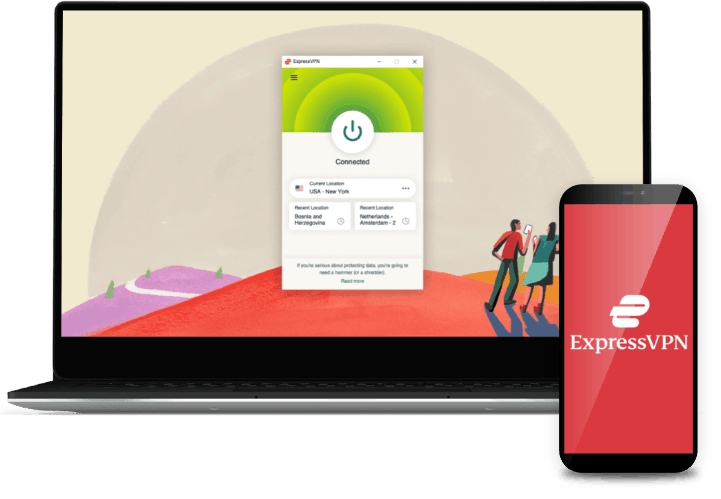
Recent News: Currently, you can get four months free if you sign up for a two-year plan. With the four free months, the average rate goes down to just $4.99 per month for 28 months.
ExpressVPN has been around for a long time and compares well to other popular VPN services. In fact, we think ExpressVPN is one of the best VPN services of 2025. Unfortunately, it isn’t one of the cheapest. For example, the most cost-effective two-year plan has a middling price tag compared to other two-year plans.
So, what do you get for ExpressVPN’s middling price tag? To start with, you get access to thousands of servers located in more than 100 countries. This VPN service is also based in the privacy-friendly British Virgin Islands. There’s a lot more to get into so let’s go over the pricing plans and features in more detail.
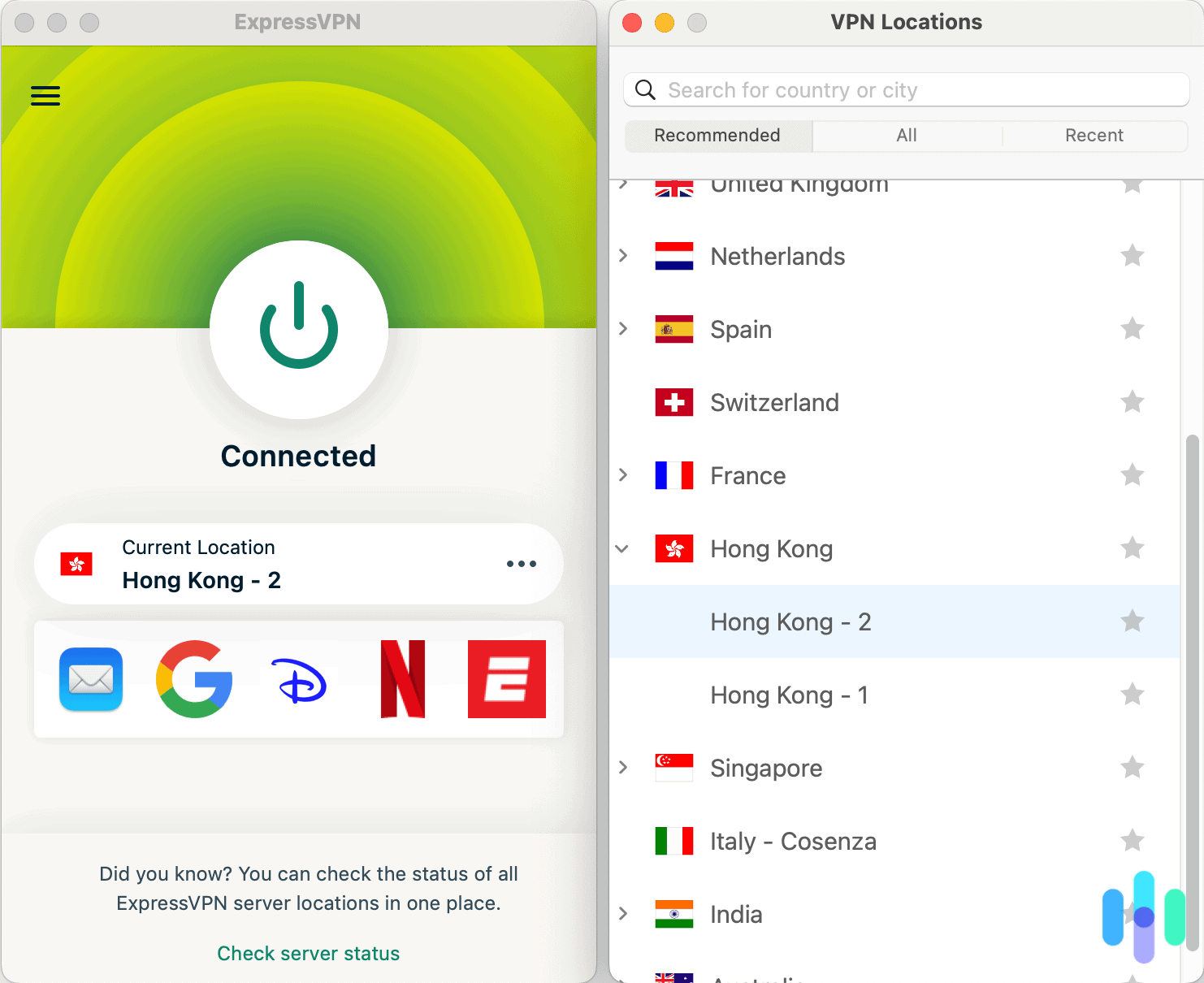
ExpressVPN and Its Place In The VPN Market
Most VPN services offer similar features on paper. So, often, the best way to evaluate them is by comparing two different services. Recently, we compared ExpressVPN and Surfshark as well as ExpressVPN and Private Internet Access — two VPNs with lower price points. We love the amount of features that ExpressVPN has to offer, but the service might be overkill compared to more affordable options. Click the links for those comparison pages to see what ExpressVPN brings for its higher price point.
ExpressVPN Cost
ExpressVPN costs either $12.95 a month, $99.95 for a year, or $139.72 for two years. See the monthly average cost below.
| Length of contract | 1 Month | 1 Year (3 months free included) | 2 Years (4 months free included) |
|---|---|---|---|
| Monthly rate | $12.95 | $6.67 | $4.99 |
| Total amount billed | $12.95 | $99.95 | $139.72 |
As you can see, the more you’re willing to pay upfront, the better the deal. Signing up for a two-year subscription with ExpressVPN saves you about $85 a year compared to paying the monthly rate. But it’s still more expensive than other companies.
With NordVPN’s plans, two years of NordVPN Basic costs $81.36, which is $55 cheaper than ExpressVPN’s 2-year plan. A one-year plan with NordVPN is $59.88, or $4.99 a month. That’s $40 cheaper than ExpressVPN.
FYI: ExpressVPN isn’t the most expensive option on the market. We tested Astrill VPN recently and the one-year plan would have set us back $180, which is almost double the price of ExpressVPN.
Another drawback for ExpressVPN is the limit of eight simultaneous connections. NordVPN allows for 10, while Surfshark and Private Internet Access offer unlimited connections. We didn’t have to kick anyone off during our testing, so this might not be a big deal for everyone. But it’s something to be aware of.
As with many digital security services, VPNs are almost always available at a discount price. Sometimes, ExpressVPN goes a slightly different route by adding free months when you sign up for a 12-month or 24-month plan. So, right now, you get 15 months of ExpressVPN for the 12-month price of $99.95. This deal has been in place for awhile but it’s definitely subject to change.
>> Related: The Best Affordable VPNs
Even without those extra offers, though, ExpressVPN makes a case for itself by offering strong security and privacy features, as we noted in our ExpressVPN review. So next, let’s take a look at how it compares to other VPNs in terms of features.
Pro Tip: You can install ExpressVPN on more than eight devices. They just can’t be all connected at the same time. If you need more than eight connections, we recommend setting up ExpressVPN on your router. Then, everything connected to your Wi-Fi will be run through a VPN.
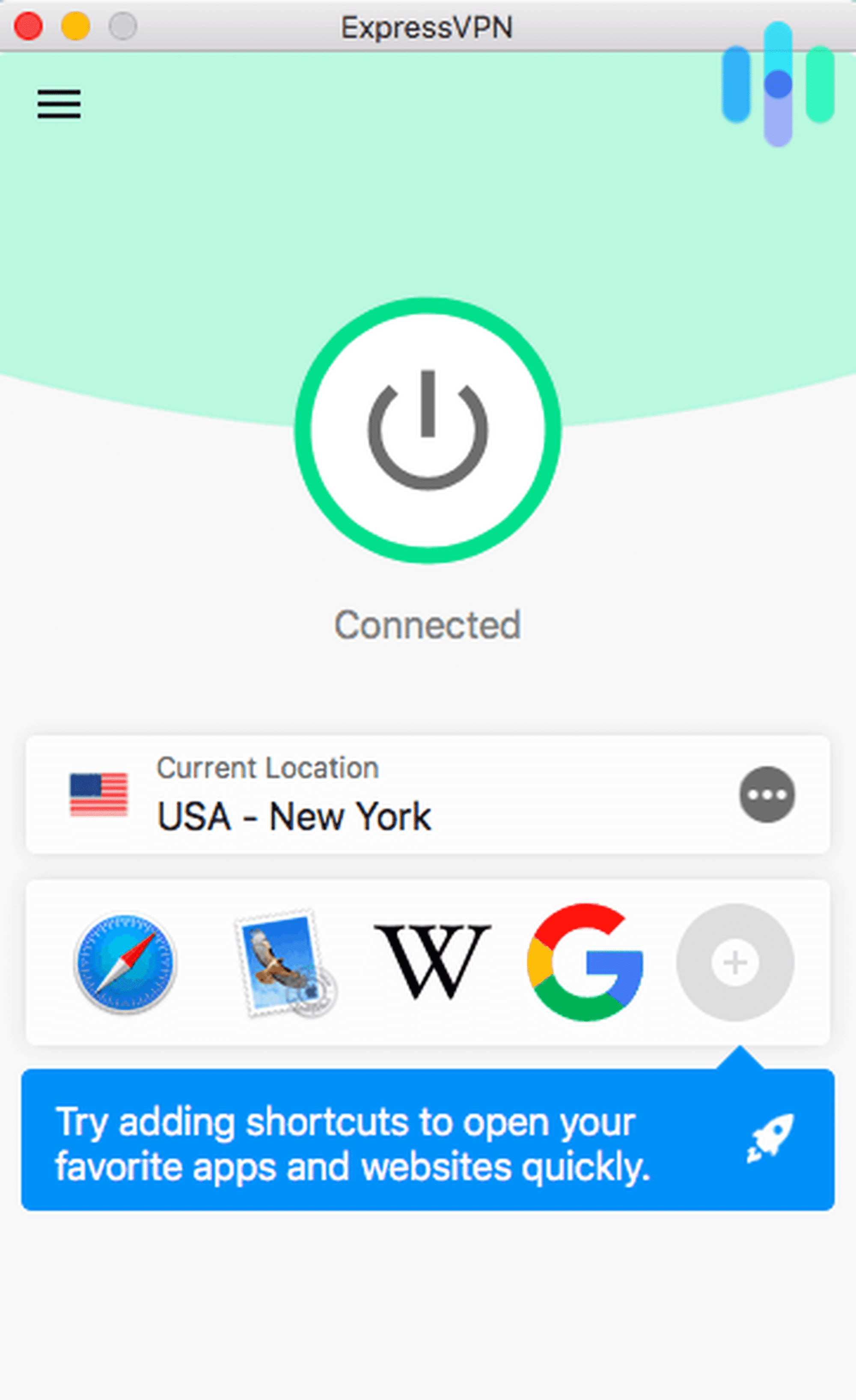
What A Subscription Includes
ExpressVPN has over 3,000 servers across 170 cities in 105 countries. It’s not as many as other VPN providers, but its distribution is on par with CyberGhost which has 11,000 servers in 100 countries.
FYI: You can compare ExpressVPN and CyberGhost head-to-head or read our CyberGhost review to get a clearer picture.
Another VPN with a similar server fleet is – you guessed it! – NordVPN. In our NordVPN review, we saw 111 server locations (countries) and over 7,200 servers. And since more servers usually results in better speeds, we named NordVPN one of the fastest VPNs. ExpressVPN isn’t far behind though. It finished eighth overall when we tested and compared VPN speeds.
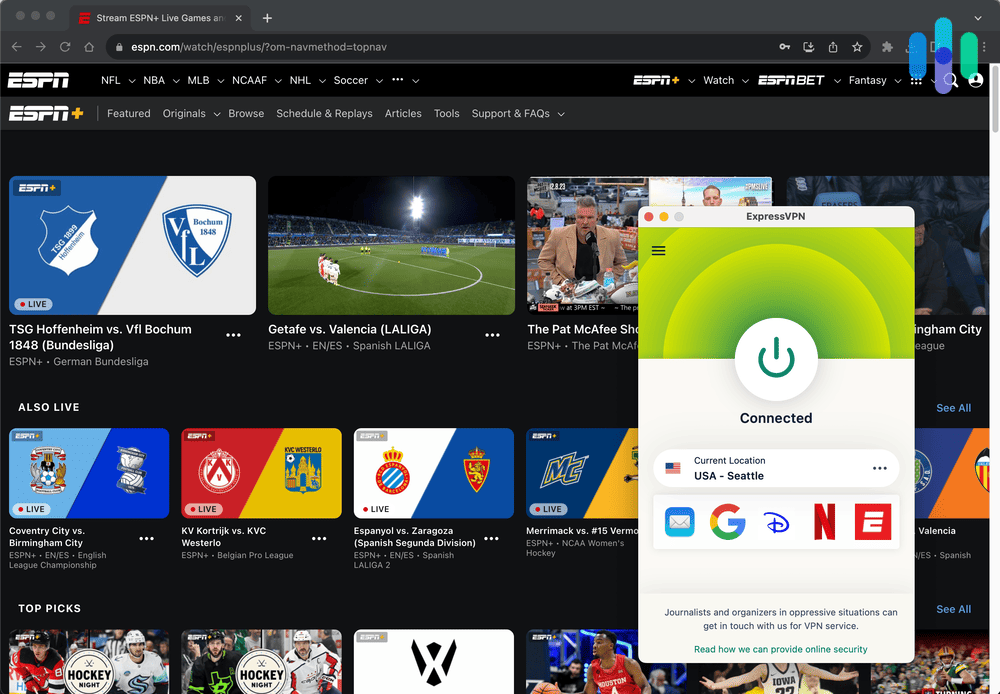
Ultimately, we recommend checking the available server locations from both services, as you’ll likely find that more relevant in your search for the better VPN. First, determine which locations you’ll likely use, then check which VPN has servers in those locations. If both of them do, we suggest picking NordVPN, as it has more servers, or you could read our comparison of NordVPN vs. ExpressVPN for a more in-depth differentiation.
You should also note that neither of the two VPNs offer unlimited simultaneous connections. We saw that feature when we reviewed Surfshark. That definitely helps if you’re running an office or business, or if you or your household simply likes having multiple devices running at the same time. Personally, we’re fine with ExpressVPN’s eight-device limit, but if you need more connections, just know that there are other options.
Pro Tip: Want to use ExpressVPN on unlimited devices at home? ExpressVPN offers Aircove, a VPN router. It’s currently the best VPN router out there, and if you connect your devices through it rather than through the ExpressVPN app, you can enjoy unlimited connections. Learn more in the section below, “ExpressVPN Aircove: Is This VPN Hardware Worth It?”
A Breakdown Of Features
ExpressVPN compares favorably to other top VPNs in terms of features. In addition to offering all the industry-standard features, ExpressVPN delivers in terms of quality. We’ve tested a lot of VPN, and it’s always great to have features that work as advertised.
For ExpressVPN, these were the most important features you’ll gain access to by signing up.
- Kill switch: When our ExpressVPN connection dropped, the VPN app prevented all internet access. This ensured we remained private – since we couldn’t browse the web until we turned ExpressVPN back on, there’s no room for us to connect to the internet and compromise our browsing traffic. The kill switch is one of the necessary VPN features.
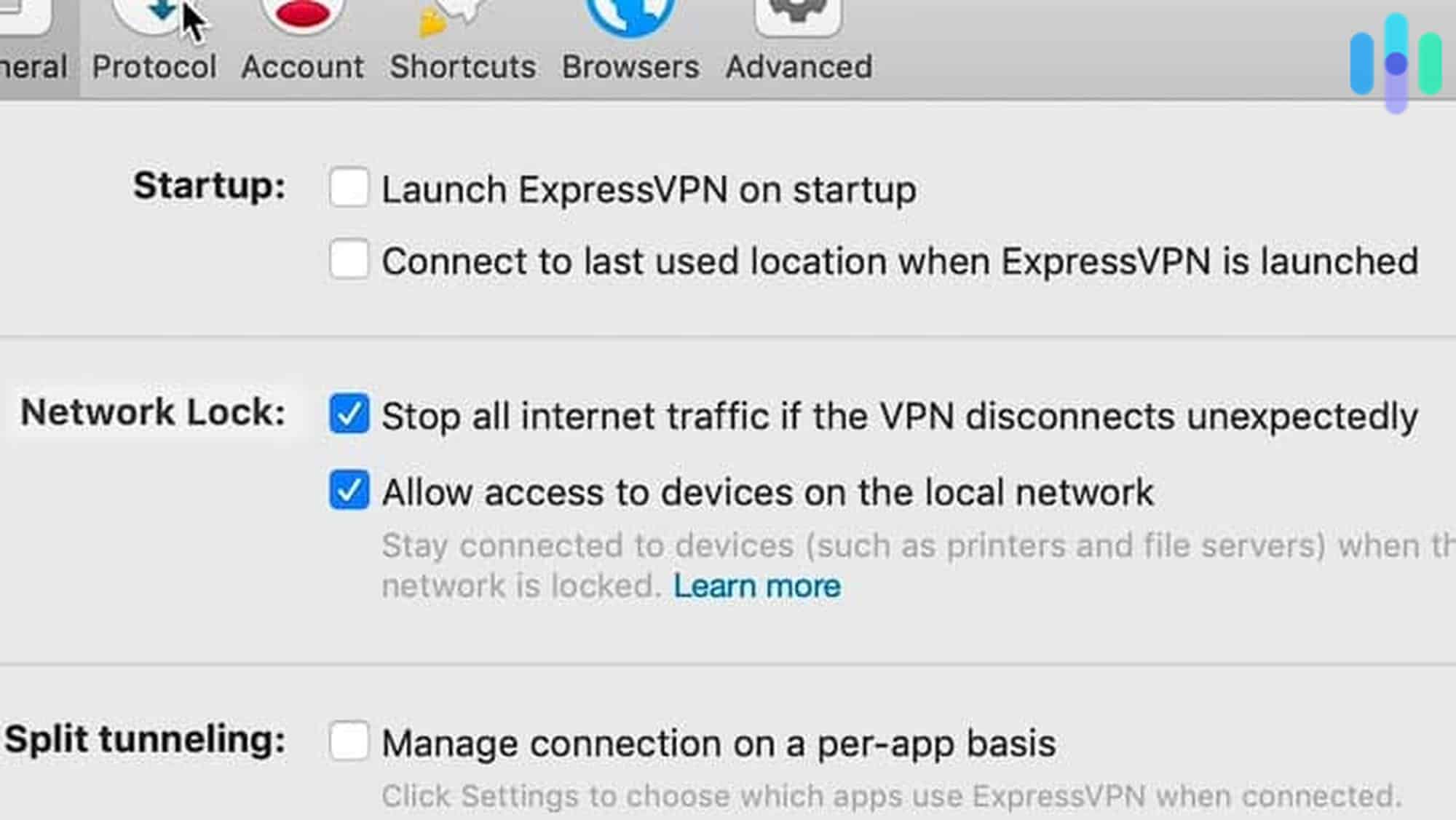
- Rotating IP addresses: One of the core functions of a VPN is to change your IP address so that the websites don’t see your real IP address. For added privacy, ExpressVPN gave us rotating (dynamic) IP addresses that changed everytime we connected. A new IP address every new connection makes it harder for anyone to track you. It may not be as great as Surfshark rotating IP address that can be programmed to change your IP address every five to 10 minutes while connected, but ExpressVPN gets the job done.
>> Learn More: Dynamic vs. Static IP addresses
- Streaming and torrenting access: A nice little side effect of changing your IP address using a VPN is that you get expanded streaming options. If you’re in the U.S., for example, getting a U.K. IP address will give you access to streaming libraries available only in the U.K. Streaming sites try to block VPN IP addresses for legal reasons, but in our experience, ExpressVPN is one of the best streaming VPNs. Besides its speed, it evaded detection by the most popular streaming sites. Not to mention, it also protected our privacy while downloading torrents.
>> Read More: VPNs for Downloading Torrent Anonymously
- Encryption: ExpressVPN encrypted our data using AES-256, the industry’s gold standard. As for protocols, it gave us a choice that included OpenVPN and its own proprietary Lightway protocol. When we weren’t sure which to use, the VPN chose the most appropriate protocol for our specific situation.
- Browser extensions: ExpressVPN browser extensions include Chrome, Safari, and Firefox. We found our Chrome extension was easy and quick to download. Once installed, it was connected quickly to ExpressVPN when we opened our browser of choice.
- Well-designed apps for multiple platforms: Most VPNs offer apps for Windows, macOS, iOS, and Android, and we found ExpressVPN’s apps for those platforms easy to use and functional. In addition, though, ExpressVPN has apps for more niched platforms, such as Android TV and Apple TV, making it easier to use on those platforms than VPNs that don’t offer native apps for them.
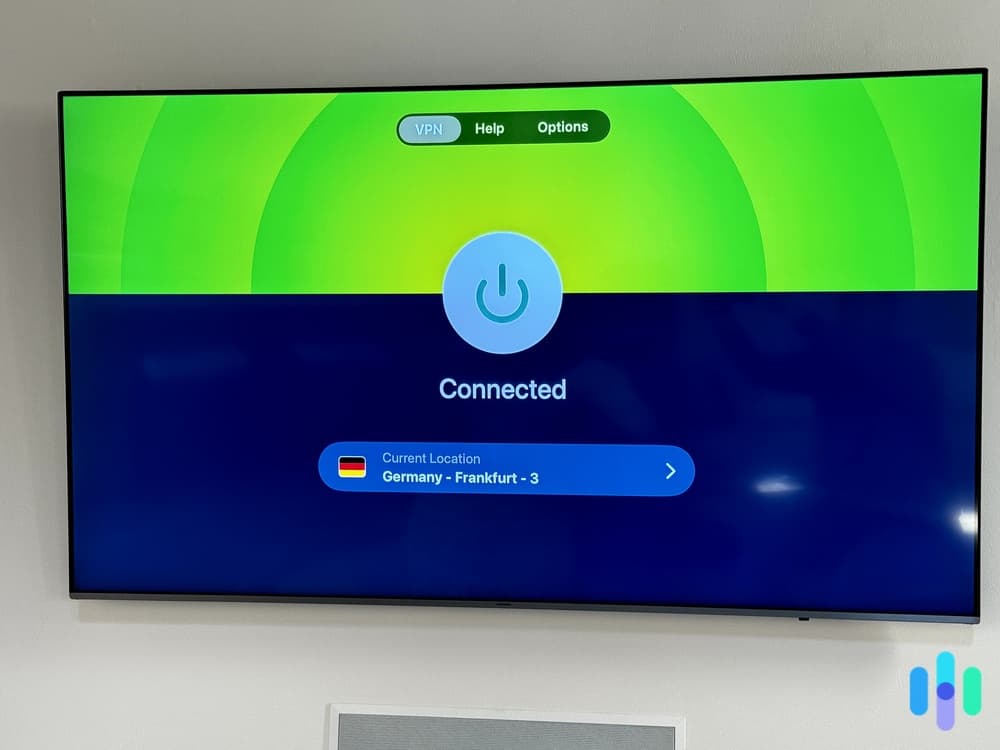
Your Privacy With ExpressVPN
When it comes to a VPN protecting your privacy, there are two main facets to consider. Is privacy-related technology up to snuff? Does the company follow strict policies that avoid data collection? Each VPN addresses these questions in different ways, with some providing better answers than others.
How ExpressVPN Provides Online Privacy
ExpressVPN uses a military-grade encryption protocol called AES 256-bit to keep your online activities private. This is the same encryption protocol used by the US military and federal government. This means if you use ExpressVPN, you get the same level of encryption as top American generals.
To be clear, many VPN services use this same encryption protocol. ExpressVPN distinguishes itself from other services with its proprietary Lightway protocol. This protocol is optimized for speed without sacrificing security or dependability. During our tests, we found that Lightway was quick and dependable, able to sustain a VPN connection while switching from mobile data to Wi-Fi.
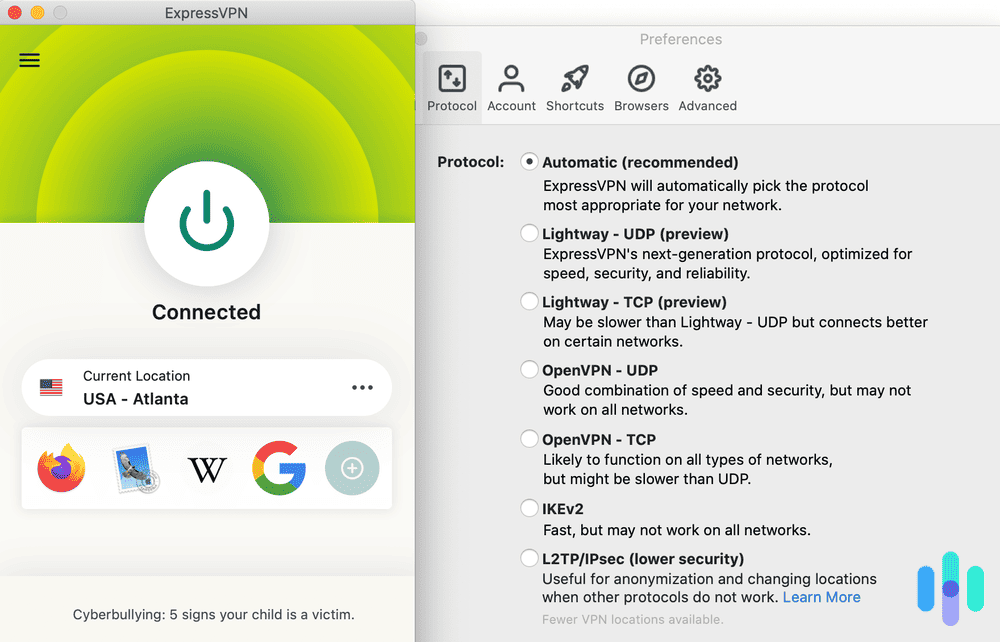
There’s also the fact that ExpressVPN is serious about keeping IP addresses hidden and safe from leaks. It has a browser extension, for example, that prevents WebRTC leaks by completely disabling your browser’s WebRTC feature. This ensures that your public IP address is always hidden when connected to ExpressVPN.
ExpressVPN Privacy Policy
The core of ExpressVPN’s privacy policy is its strict no-logs policy, which means the company doesn’t collect data on user activity. So, if you use an ExpressVPN server in the United Kingdom to watch live BBC News, neither ExpressVPN nor the BBC will know anything about you doing it. This also means you won’t get targeted ads related to your activity. If you use ExpressVPN to buy holiday gifts for your wife, she won’t see targeted ads for those gifts when she watches YouTube videos.
Of course, a lot of VPN companies claim that they don’t log any data even though they actually do. So how do we know ExpressVPN is true to its word?
ExpressVPN has submitted itself to multiple third-party audits. Recently, its privacy policy was audited by KPMG, one of the big-four international auditing firms. The 36-page report from KPMG details exactly what ExpressVPN’s servers record, how secure they are in the company’s possession, and with whom they are shared. Overall, ExpressVPN passed the audit.
From a legal standpoint, ExpressVPN is protecting its users’ privacy simply by establishing its headquarters in the British Virgin Islands, a country outside the Five Eyes, Nine Eyes, and 14 Eyes surveillance networks. Essentially, that means the government can’t force ExpressVPN to turn over any of its customer data.
ExpressVPN Aircove: Is This VPN Hardware Worth It?
An ExpressVPN subscription allows up to eight devices to connect to the service simultaneously. However, there’s a way around that limit, and it involves a more seamless VPN connection. ExpressVPN sells a router called Aircove that can tunnel all traffic on its network to a VPN server.
Just to clarify, a lot of other VPNs can be installed on a router. Aircove, however, is a router with built-in ExpressVPN software, so it doesn’t require as much setup as other router VPNs. Better still, all the devices you connect to it will enjoy ExpressVPN’s protections, so you can surpass the five-device limit.
Some of Aircove’s top features are:
- VPN for all devices: You can set up the Aircove router so that every device connected to it is protected by ExpressVPN, even devices that don’t traditionally work with VPNs such as IoT devices and gaming consoles.
- Customizable VPN settings: Unlike VPNs installed on third-party routers, Aircove lets you configure how your devices connect to ExpressVPN. For example, you can group devices together and have them connect to a specific server. Your smart TVs can connect to a U.K. server so you can access Netflix U.K., for instance, while your mobile devices connect to the nearest server for fastest speeds.
- Stable speeds: The Aircove router is designed to deliver stable speeds, with or without a VPN. Its 2.4 GHz band can reach speeds up to 600 Mbps, while its 5 GHz band can reach up to 1,200 Mbps.
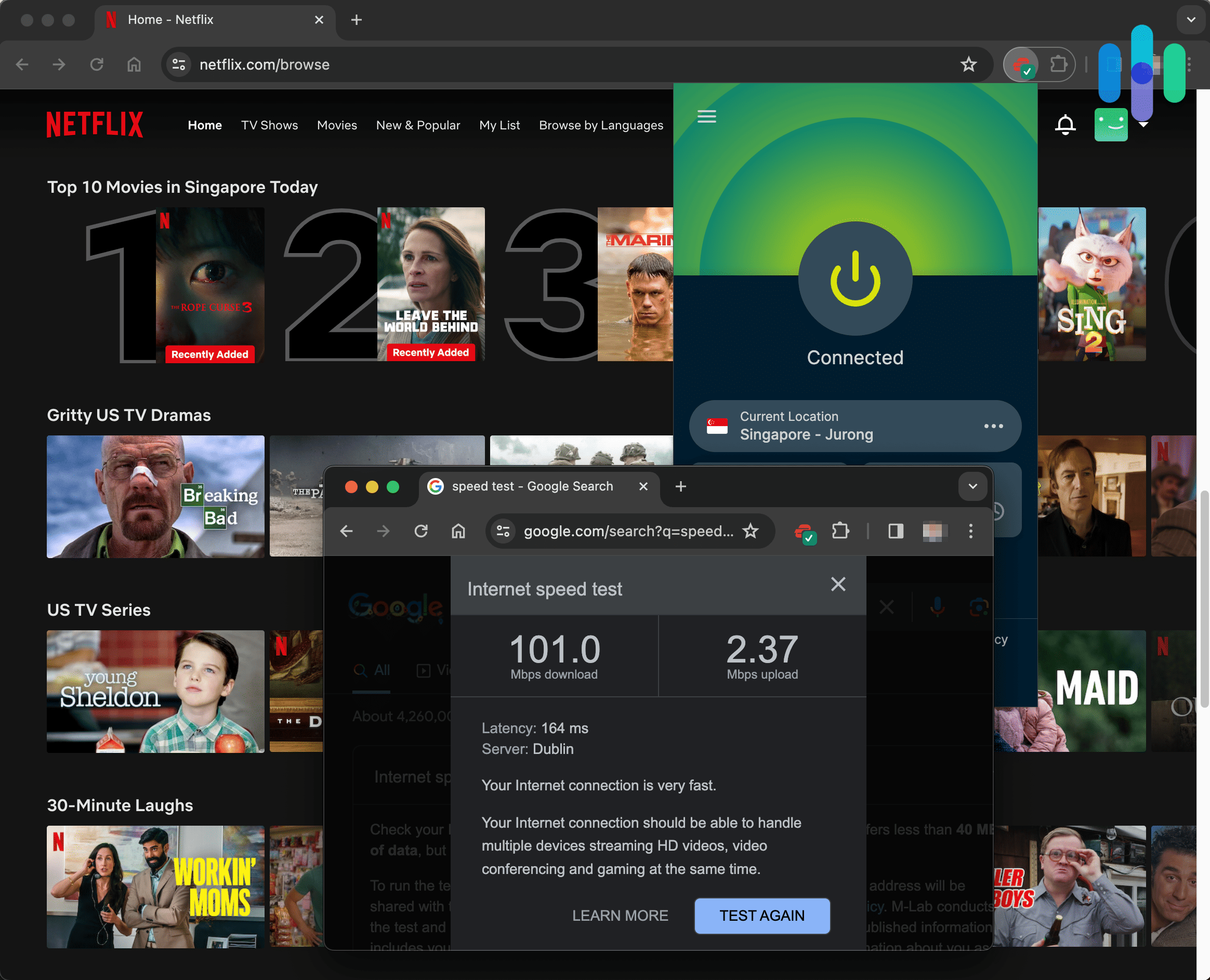
- Network management: You can also manage each device’s internet connectivity. For example, you can block a device from accessing the internet, which can be useful for setting up screen time limits.
- Web app access: The ExpressVPN web app specifically built for the Aircove router lets you easily control VPN and router features.
Another great thing about Aircove is that it’s easy to customize your VPN and network settings. Usually, if you connect a router to a VPN, you’ll need to go through a number of settings just to change your VPN server location. With Aircove, you can do so via an app, and you can even set up multiple locations for different connected devices.
The Aircove router costs $189.90. It’s in the same price range as many mid- to high-end routers. It offers promising networking specs, but compared to similarly priced routers, it’s not as performance-optimized. We could argue that the higher price is due to the VPN features, but also keep in mind that it requires an on-going ExpressVPN subscription to offer all its VPN features.
Still, the Aircove is an innovative solution for those who need a router that can connect their devices to a VPN, such as those who own internet-connected devices that can’t connect to a VPN directly. A few examples come to mind, like smart home devices, gaming consoles, and older Apple TVs.
>> Check Out: The Best Apple TV VPNs
Aircove Go: Portable VPN Router
Aside from Aircove, ExpressVPN now has a portable VPN router called Aircove Go. It gives access to ExpressVPN features just like the full-sized Aircove, but Aircove Go is much more portable. It fits in the palm of your hand. It’s also a bit more affordable, but still pricey. It sells for $169.90.
Feature-wise, it’s not as powerful as the Aircove. The Wi-Fi 6 signal it transmits is capable of covering a 750-square-feet area; not really ideal for even a small home. But the Aircove Go is designed to be portable. You can use it to protect your devices while staying at a hotel or using the internet at a coffee shop. And unlike its full-sized sibling, the Aircove Go doesn’t need an Ethernet cable to connect to the main router. It has a feature called Wi-Fi link that is entirely wireless.
Is it worth it? It really depends on how you use it. If you travel frequently and stay at different hotels or short-term rentals with Wi-Fi, it might make sense to take Aircove Go with you. It’s portable and it’s great way to protect all your devices without worrying about ExpressVPN’s device limit. It might also be a more affordable and practical choice for small apartments or a home office. Otherwise, we’d recommend going with the more powerful Aircove.
Can I Try ExpressVPN for Free?
| Options | ExpressVPN |
|---|---|
| Free trial | None |
| Money-back guarantee | 30 days |
Many VPN companies have free VPN options, albeit with limited data, speed, server options, or features. That can be especially useful when you’re trying to decide which VPN service is right for you. While ExpressVPN does offer free trials for some mobile devices, those trials are not a part of its typical subscription options.
However, with any of the subscriptions, we got a 30-day money-back guarantee. That meant that if at the end of the month we didn’t want to continue with ExpressVPN, we could’ve gotten our money back. Bottom line: no, ExpressVPN doesn’t offer a free trial in any regular sense (although make sure you check out our ExpressVPN deals page for seasonal discounts).
FYI: While ExpressVPN has no free option, if you aren’t satisfied with the service, you can get your money back if you cancel within 30 days.
Deals and Discounts
ExpressVPN may not have a completely free subscription option, but it does offer its fair share of deals and discounts throughout the year.
Black Friday and Cyber Monday
ExpressVPN holds a sale every Black Friday and Cyber Monday, which this year fall on November 28 and December 1. The deals on these dates are usually the best you’ll see all year. ExpressVPN’s Black Friday deal for 2024 included six free months added to a two-year subscription and four months added to a one-year plan. That brought the average monthly rate down significantly, but it was still pricier than other VPNs.
Refer A Friend Program
There are other ways to get free months of the service as well. The company has a program that rewards you with 30 days of free service every time you refer a friend. Of course, the friend does have to sign up, but to sweeten the deal, ExpressVPN will give them a free 30 days as well. Everybody wins.
ExpressVPN even offers a referral option in the VPN app itself. Type in your friend’s email address, and once they purchase a subscription you’ve got 30 days for free. It doesn’t get much easier than that.
Of course, other VPNs have similar friend programs. NordVPN’s program is basically identical to ExpressVPNs, as you can see on our page about NordVPN deals.
Surfshark’s deals go even further. Not only can you get one month free for one friend, but if you refer three friends, you get six months, and if you refer five, you get a year for free. The point here is that if you look hard enough, you can always find ways to save on your VPN subscription, even from the top VPN brands.
Payment Options with ExpressVPN
We paid with a simple Visa, but ExpressVPN offers a number of different payment options, including:
- Credit card: Visa, American Express, Mastercard, JCB, Discover, Diners Club International, Visa Electron
- Paypal
- Bitcoin or BitPay
- Miscellaneous payment methods: Maestro, FanaPay, Mint, OneCard, WebMoney, Giropay, Yandex Money, Alipay, iDEAL, Klarna, UnionPay, Interac Online, Carte Bleue, etc.
We like that ExpressVPN is super flexible in regard to its payment options. Many people searching for a VPN are doing so because of privacy concerns, so the fact that ExpressVPN allows for more anonymous payment options is another feather in its cap.
How Do I Cancel ExpressVPN?
How to cancel ExpressVPN depends on which payment method you use:
- PayPal or credit card:
- Sign in and click Subscription.
- Choose Manage Settings.
- Go to the Automatic Renewal Settings page.
- Turn off Automatic Renewal and confirm.
- BitPay or Paymentwall: Unlike a subscription paid for by PayPal or a credit card, subscriptions paid for by BitPay or Paymentwall don’t renew automatically. That means there’s no need to cancel if you are done with the service at the end of your billing cycle.
Tip: Need help canceling ExpressVPN? Use the live chat option on its website to contact customer support.
Top Features of ExpressVPN
We think ExpressVPN is worth its prices, which is why it’s on our list of the best VPNs. Here’s what we liked about it specifically:
- Strict logging policy: ExpressVPN didn’t hold onto any of our web traffic, IP addresses, metadata, or DNS queries.
- Highly-rated app: Android and iPhone users alike should have no issues connecting to ExpressVPN on their mobile devices. The apps are totally user-friendly and intuitive.
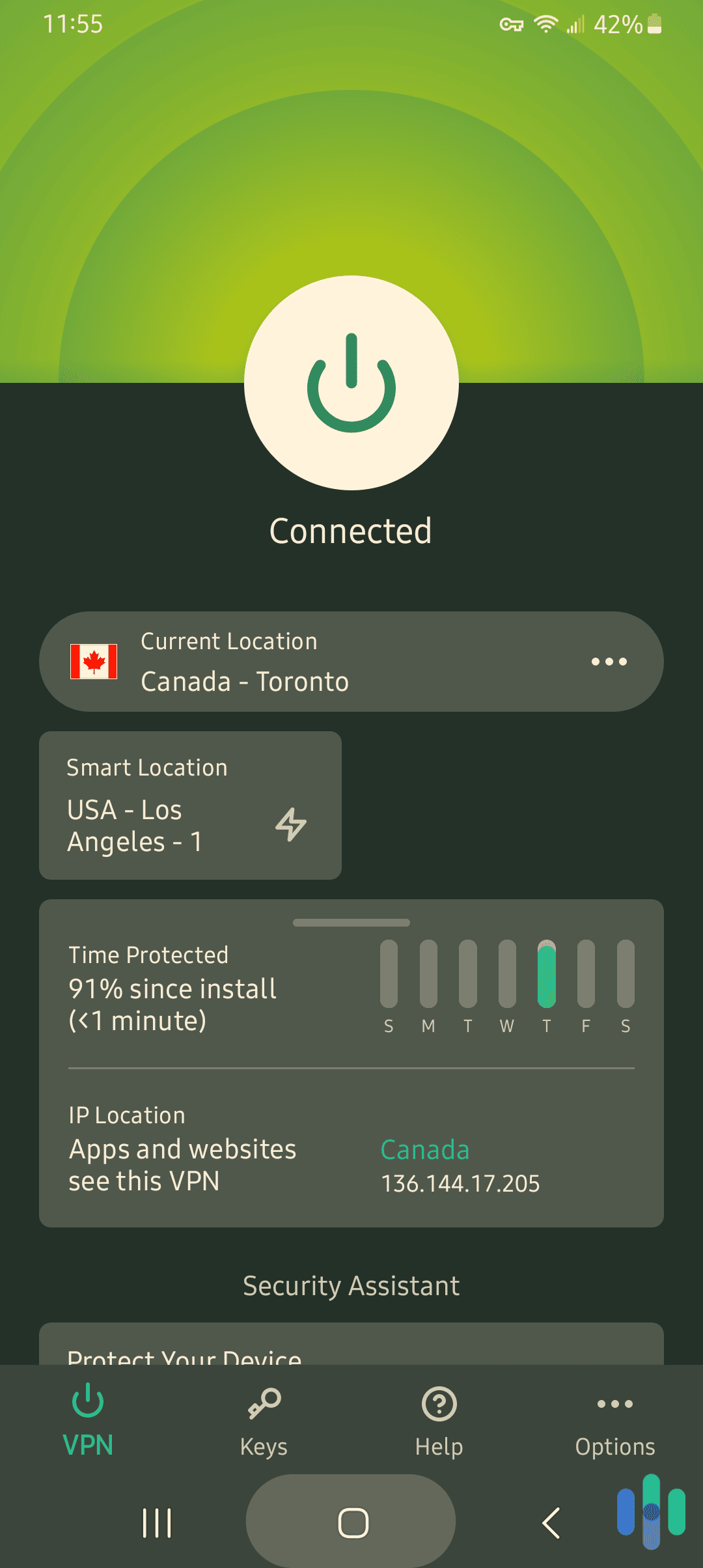
- Quick speeds: When we tested out ExpressVPN in terms of download speed, upload speed, and lag time on our Windows and Mac computers, we didn’t find too much of a noticeable slowdown.
- Headquarters: Since ExpressVPN as a company is based in the British Virgin Islands, it can never be legally forced to give customer data to the government. That’s because the British Virgin Islands aren’t members of Five Eyes, Nine Eyes, and 14 Eyes.
- Split tunneling: When we needed to toggle back and forth between public and private networks, we could leave ExpressVPN connected, as it allows for both connections at the same time.
- Streaming: Not only did ExpressVPN work with Netflix, but it also worked when we wanted to torrent movies and TV shows (because believe it or not, Netflix doesn’t have absolutely everything on it).
- Password Manager: ExpressVPN Keys, the newest offering from ExpressVPN, enhances the VPN subscription with an encrypted password vault to store passwords safely and securly.
Did You Know? Although they’re a territory of the United Kingdom, the British Virgin Islands (BVI) are self-governed and a non-member to Five Eyes, Nine Eyes, and 14 Eyes. As a result, BVI can’t be forced to make companies give them customer data.
Find out if ExpressVPN can protect your home like other VPNs
We tested ExpressVPN and compared it side-by-side with other brands to give you the full picture.
>> Worth a Read: Best ExpressVPN Alternatives
Summary
ExpressVPN certainly isn’t the cheapest option around, but it’s not the most expensive either. We’d certainly recommend it as a VPN, especially for people seeking a basic VPN service. The user interfaces are very easy to use, and there aren’t tons of settings to get bogged down in. By comparison, NordVPN has a ton of settings that mid-level and expert VPN users can tweak based on various use cases.
With a trustworthy logging policy and company history, ExpressVPN is always a go-to suggestion of ours whenever anyone asks us for a VPN. It’s consistently on our “best of” lists, from the best VPNs for iPhones to the best VPNs for Androids. No matter your mobile device, ExpressVPN is a solid option to protect your web traffic without breaking the bank.
ExpressVPN Frequently Asked Questions
Since ExpressVPN is one of the most well-known VPNs on the market, we get asked a ton of questions about it. Here are some answers:
-
Is ExpressVPN legit?
ExpressVPN is completely legitimate as a VPN and a company alike. The company has more than 3,000 VPN servers in 160 locations all around the world, and it’s known for its no web traffic logging policy.
Plus, the fact that the company is based in the British Virgin Islands makes it even more trustworthy, as the Virgin Islands are a non-member to the international surveillance alliances Five Eyes, Nine Eyes, and 14 Eyes. In other words, the government can’t force ExpressVPN to hand over customer data. That’s not always the case with VPN companies.
-
Is ExpressVPN free?
ExpressVPN does offer some free trial options on certain mobile devices. However, for the most part, the service is not free.
Rather, ExpressVPN is a paid service with options available for a month, one year, or two years. The one and two-year packages include free extra months, but there’s no totally free version of ExpressVPN in the traditional sense. However, if you’re looking to test out the service, ExpressVPN does offer a 30-day money-back guarantee.
-
How much does ExpressVPN cost?
The per-month cost of ExpressVPN depends on the term length you sign up for. One month costs $12.95, one year costs $99.95 which breaks down to $6.67 a month, and two years costs $139.725, which breaks down to $4.99 a month.
Length of contract 1 month One Year Two Years Monthly rate $12.95 $6.67 $4.99 Total amount billed $12.95 $99.95 $139.72 -
Which is better, NordVPN or ExpressVPN?
We recommend going with ExpressVPN over NordVPN. The two VPNs are neck-and-neck in terms of their logging policies, kill switches, and Netflix and torrenting capabilities.
However, ExpressVPN offers split tunneling, which NordVPN lacks. NordVPN does let users choose a static IP address, better for a gamer or someone using the VPN for business purposes. For the rest of us, though, ExpressVPN’s rotating addresses mean it’s harder for anyone to spy on what we’re doing online. It’s a very close call, but in the end, ExpressVPN wins by a hair.
-
Does ExpressVPN work for Netflix?
Yes, ExpressVPN works with Netflix. This means you can watch the streaming service no matter where you are in the world. It also means you can access other countries’ Netflix libraries when you’re here in the good old U.S. of A.






